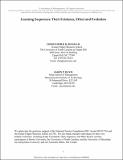Learning Sequences: Their Existence, Effect, and Evolution
Author(s)
Bingham, Christopher B.; Davis, Jason
DownloadDavis_Learning sequences.pdf (591.3Kb)
OPEN_ACCESS_POLICY
Open Access Policy
Creative Commons Attribution-Noncommercial-Share Alike
Terms of use
Metadata
Show full item recordAbstract
Much is known about the importance of learning and some of the distinct learning processes that organizations use (e.g., trial-and-error learning, vicarious learning, experimental learning, and improvisational learning). Yet surprisingly little is known about whether these processes combine over time in ordered ways, because most research on learning explores one particular process. Using theory elaboration and theory-building methods and data on the accumulated country entries of entrepreneurial firms, we address this gap. Our core contribution is an emergent theoretical framework that develops the concept of learning sequences. We find that learning sequences exist and are influenced by initial conditions. We also find that learning sequences evolve in fundamentally distinct ways over time and with repeated use. Finally, data show how different learning sequences differentially affect both shorter- and longer-term performance, suggesting that it matters which learning processes are used and when. Overall, our findings on learning sequences have important implications for learning theory, international entrepreneurship, and the growing literature on process management.
Date issued
2012-06Department
Sloan School of ManagementJournal
Academy of Management Journal
Publisher
The Academy of Management
Citation
Bingham, C. B., and J. P. Davis. “Learning Sequences: Their Existence, Effect, and Evolution.” Academy of Management Journal 55.3 (2012): 611–641.
Version: Author's final manuscript
ISSN
0001-4273
1948-0989